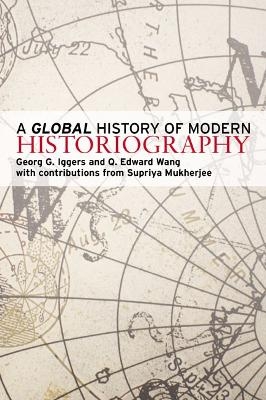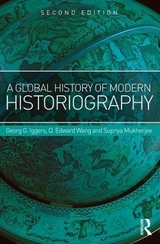
A Global History of Modern Historiography
Routledge (Verlag)
978-0-582-09606-6 (ISBN)
- Titel erscheint in neuer Auflage
- Artikel merken
Tracing the transformation of historical writings over the past two and half centuries, the book portrays the transformation of historical writings under the effect of professionalization, which served as a model not only for Western but also for much of non-Western historical studies. At the same time it critically examines the reactions in post-modern and post-colonial thought to established conceptions of scientific historiography.
A main theme of the book is how historians in the non-Western world not only adopted or adapted Western ideas, but also explored different approaches rooted in their own cultures.
Georg Iggers is a distinguished professor emeritus from the State University of New York. He is a respected academic who has taught in the US, Asia and Europe. From 1995 - 2000 he was president of the International Commission for the History and Theory of Historiography. Having fled the Nazis as a child, he has been active in the Civil Rights movement in the US Q. Edward Wang is professor and chairperson of the History Department at Rown University in Glassboro New Jersey. His main field is Asian history, but he has also taught courses on Western Civilization and Historiography and Historical Methods. Supriya Mukherjee teaches at the University of Memphis with a focus on the history of the German Kaiserreich and Weimar periods, Contemporary History, and modern Indian issues.
Preface and acknowledgements
Introduction
Part I: Historiographical traditions in the world: A view of the eighteenth century
1. Where we begin?
2. The West.
3. The Middle East.
4. India.
5. East and South East Asia.
Part II: The advance of nationalism and nationalist history: The West, the Middle East and India in the nineteenth century.
6. Historiography in a revolutionary age between 1789 and 1848.
7. Nationalism and the transformation of Muslim historiography.
8. Nationalism and the transformation of Indian historiography.
Part III: Academic history and the shaping of historical profession: Transforming historical study in the nineteenth–century West and East Asia.
9. The cult of science and the nation-state paradigm (1848–90).
10. The crisis of Confucian historiography and the creation of the modern historical profession in East Asia.
Part IV: Historical writings in the shadow of two world wars: The crisis of historicism and modern historiography.
11. The reorientation of historical studies and historical thought (1890–1914).
12. Historiography between Two World Wars (1918–1939).
Part V: The appeal of nationalist history around the world: Historical studies in the Middle East and Asia in the twentieth century.
13. Ottomanism, Turkism and Egyptianization: Nationalist History in the Middle East.
14. Nationalism, scientism, and Marxism: modern historiography in East and South East Asia.
15. Nationalist historiography in modern India.
Part VI: New challenges in the post-war period: from social history to postmodernism and postcolonialism.
16. The Cold War and the emergence of the New World Order.
17. Varieties of social history (1945–1968/70) in the West.
18. The 1970s and 1980s: the cultural turn and postmodernism.
19. Postcolonialism.
20. The ebb and flow of Marxist historiography in East and South East Asia.
21. Islamism and Islamic historiography: the Cold War and beyond.
22. Historiography after the Cold War, 1990–2007: A critical retrospect.
23. The globalization of the world.
24. The reorientation of historical studies.
Glossary.
Further reading.
Index.
Preface and acknowledgements
Introduction
Historiographical traditions in the world: A view of the eighteenth century
Where we begin?
Transcultural comparisons
Characteristics of historiographical thought in different cultures
The West
Characteristics of Western historiography
The emergence of an enlightenment worldview
Erudition and critical historical scholarship
Enlightenment historiography
German forms of enlightenment
The emergence of a republic of letters
From universal history to eurocentric ideas of progress
Concluding observations
The Middle East
The rise of Islam and the origin of Muslim historiography
Main styles in Muslim historiography
The bureaucratization and secularization of historiography
The decline of the Muslim world and Muslim historiography?
India
Western views on Indian historical consciousness
Indian forms of historical writing
Social and intellectual transformations during the early modern period
East and South East Asia
Shamanism and history: the origin of the ‘shi’
The formation of Confucian historiography
The history bureau and dynastic history
The spread and influence of dynastic historiography
‘To seek the truth from facts’: the rise of evidential learning
The advance of nationalism and nationalist history: The West, the Middle East and India in the nineteenth century
Historiography in a revolutionary age between 1789 and 1848
The political context
Romanticism and historiography
The impact of emergent nationalism on historiography
The relationship between professional scholarship and nationalism
The liberal reinterpretation of the Middle Ages
The colonial perspective and historiography
The decline of liberalism in historiography
Ideas of progress and of crisis
Hegel’s philosophy of history
Nationalism and the transformation of Muslim historiography
The Muslim ‘discovery’ of Europe
Whose Pharaohs? – (re)writing the history of Egypt
National identity and historical writing
Bridging the old and the new: the ‘encyclopedists’ and the ‘neo-chroniclers’
Nationalism and the transformation of Indian historiography
Historiography during early colonialism
The new pedagogy and the emergence of a modern historical consciousness
Religious revivalism and the search for a glorious past
The birth of the rationalist paradigm
The birth of the nationalist paradigm
Nationalism, communalism, and historical writing
Secular narratives and the emergence of economic nationalism
Academic history and the shaping of historical profession: Transforming historical study in the nineteenth–century West and East Asia
The cult of science and the nation-state paradigm (1848–90)
The political context of historiography
The social context of historiography
The turn to ‘scientific’ history
The crisis of Confucian historiography and the creation of the modern historical profession in East Asia
Accommodating the Western influence
Civilization and history: a new worldview
The interplay of the old and the new
George Zerffi, Ludwig Riess and the Rankean influence in Japan
Japan’s ‘Orient’ and the changing of the sinitic world
Historical writings in the shadow of two world wars: The crisis of historicism and modern historiography
The reorientation of historical studies and historical thought (1890–1914)
The changing political and cultural climate
The challenge to traditional historiography
The existential crisis of modern civilization
Historiography between Two World Wars (1918–1939)
The historians in World War I
The critique of rationality and modernity and the defenders of the enlightenment
The appeal of nationalist history around the world: Histori in the Middle East
The rise of modern education
Writing Turkish history in/for modern Turkey
The Egyptianization of historical writing
Academic history and national politics
Nationalism, scientism, and Marxism: modern historiography in East and South East Asia
‘New historiography’ in China
The tension between national history and scientific history
Modifying the Rankean model: national history in Japan
Myth and history: in search of the origin of the Korean nation
War and revolution: the appeal of Marxist historiography
Nationalist historiography in modern India
Late nineteenth–century antecedents: romantic nationalism
The role of religion in nationalist historiography
The nation as history and history as science
The romance of the local and the emergence of alternative narratives
The nation re-imagined: the Nehruvian synthesis
Post-independence historiography: old and new trajectories
Towards a social science history
New challenges in the postwar period:from social history to postmodernism and postcolonialism
The Cold War and the emergence of the New World Order
Varieties of social history (1945–1968/70) in the West
The United States: from consensus to the New Left
France: the ‘Annales’
Germany: from Historismus to a critical historical social science
Marxist historiography between orthodoxy and new directions
The 1970s and 1980s: the cultural turn and postmodernism
From social science history to the cultural turn
Micro-history, the history of everyday life, and historical anthropology
Oral history and the history of memory
The ‘history workshop’ movement
Feminist and gender history
Postcolonialism
The subaltern studies
Latin America: from Dependencia theory to subaltern studies
The emergence of modern historiograph historical writings in late twentieth–century Asia and the Middle East
The ebb and flow of Marxist historiography in East and South East Asia
Reinventing Japan: post-war reform of historical education and writing
The dominance of Marxist historiography in the People’s Republic of China
Challenges to Marxist historiography and eurocentrism
Between Marxism and Nationalism: academic history in Vietnam
The resurgence of national history
The Annales School, postmodernism, and new changes in Japanese historiography
China’s search for alternatives to Marxist historiography
Islamism and Islamic historiography: the Cold War and beyond
Globalizing Islamic historiography
The interplay of history and historiography
Edward Said and the critique of Orientalism
The appeal of Marxism and Socialism
The Islamic Revival – Islamism and nationalism
History and politics: the challenges of nationalist historiography
Historiography after the Cold War, 1990–2007: A critical retrospect
The globalization of the world
The reorientation of historical studies
The cultural and the linguistic turn
Feminist and gender history
Redefining the alliance between history and social sciences
New challenges to nationalist history
World history, global history and history of globalization
Glossary
Further reading
Index
| Erscheint lt. Verlag | 27.3.2008 |
|---|---|
| Verlagsort | London |
| Sprache | englisch |
| Maße | 234 x 156 mm |
| Gewicht | 670 g |
| Themenwelt | Geisteswissenschaften ► Geschichte ► Allgemeine Geschichte |
| Geisteswissenschaften ► Geschichte ► Geschichtstheorie / Historik | |
| ISBN-10 | 0-582-09606-5 / 0582096065 |
| ISBN-13 | 978-0-582-09606-6 / 9780582096066 |
| Zustand | Neuware |
| Haben Sie eine Frage zum Produkt? |
aus dem Bereich



